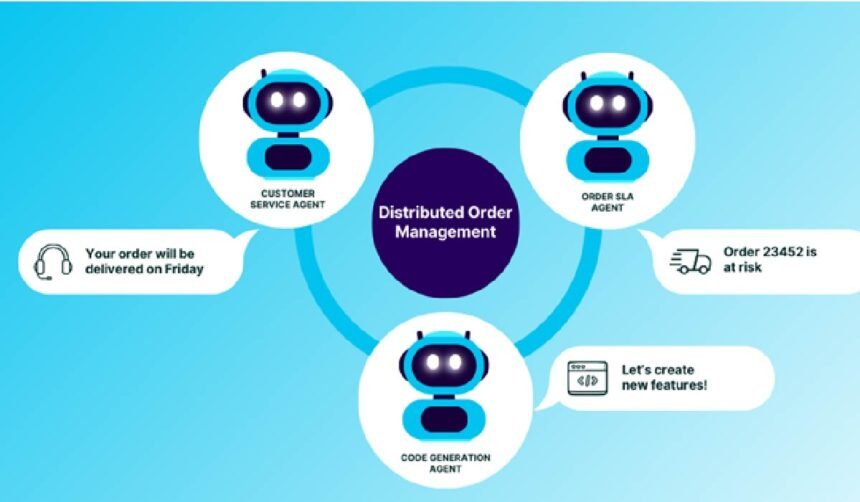In today’s hyper-competitive and globalized markets, businesses are under constant pressure to enhance the efficiency, transparency, and responsiveness of their supply chains. Traditional methods of quality monitoring and order management often fall short—relying heavily on manual processes, fragmented data, and reactive strategies. Fortunately, Artificial Intelligence (AI) is transforming these core supply chain functions, enabling proactive quality assurance and smarter order fulfillment.
Let’s explore how AI-powered tools are reshaping quality monitoring and order management to drive operational excellence, reduce risks, and improve customer satisfaction.
The Role of AI in Supply Chain Transformation
AI introduces predictive capabilities, real-time analytics, and intelligent automation across the supply chain. In quality control and order handling, AI-driven agents continuously monitor, detect anomalies, and recommend actions to prevent bottlenecks or quality lapses before they escalate.
Enhancing Supplier Quality Monitoring with AI
Maintaining consistent supplier performance and product quality is a persistent challenge—especially when sourcing from multiple regions or third parties. AI offers a strategic advantage by ensuring end-to-end visibility and compliance.
AI for Proactive Quality Monitoring
Traditional supplier evaluation is usually periodic and reactive, often identifying issues after products reach production lines or customers. AI changes this by offering real-time quality monitoring. Tools like ZBrain’s quality monitoring in supplier management agent leverage machine learning models to detect deviations in supplier performance and trigger automated alerts.
Key Capabilities of AI-Based Supplier Quality Monitoring:
- Automated Defect Detection: AI systems analyze data from supplier deliveries, inspection reports, and IoT devices to identify trends or anomalies—flagging defects earlier in the lifecycle.
- Risk Scoring and Benchmarking: AI agents assess supplier behavior across metrics like defect frequency, delivery timelines, and compliance, providing dynamic risk scores and performance benchmarks.
- Root Cause Analysis: By aggregating and analyzing historical data, AI identifies patterns that contribute to recurring issues, enabling procurement teams to take corrective actions swiftly.
This not only improves product quality but also reduces rework, returns, and reputational damage.
Optimizing Order Management with AI
As e-commerce and customer expectations soar, businesses need intelligent order management systems that ensure speed, accuracy, and adaptability. Enter AI-driven order orchestration.
Smart Order Processing with AI
The integration of AI into order management simplifies decision-making, reduces errors, and enhances customer satisfaction. Platforms like ZBrain have developed advanced AI in order management agents that support every stage of the process—from order capture and validation to inventory checks and shipping.
How AI Transforms Order Management:
- Demand Forecasting: AI models analyze historical sales, seasonal trends, and market signals to predict demand with high accuracy—allowing businesses to adjust procurement and production accordingly.
- Order Validation and Fraud Detection: AI agents cross-check incoming orders with customer records, credit scores, and past transactions to validate authenticity and prevent fraudulent orders.
- Inventory Optimization: AI-powered systems track inventory levels in real time and recommend optimal restocking strategies, ensuring that popular products are always available without overstocking.
- Delivery Scheduling: AI helps optimize routing, reduce shipping times, and proactively resolve logistics delays by integrating with carrier APIs and weather data.
These capabilities help businesses reduce fulfillment time, cut operational costs, and enhance the overall buyer experience.
Synergies Between Quality Monitoring and Order Management
While AI in quality monitoring and order management may seem like two separate applications, they are interlinked within a broader supply chain strategy.
Shared Data, Shared Intelligence
Both systems benefit from unified data sources—product specs, supplier history, delivery metrics, and customer feedback. AI agents can use this shared intelligence to detect if defective components from a supplier are causing higher return rates or delays in order processing. This level of visibility helps businesses act faster and with more precision.
Feedback Loops for Continuous Improvement
AI-driven systems thrive on data. With feedback loops in place, every order error, quality issue, or delivery delay becomes a learning opportunity. AI models retrain on this data to improve predictions, recommendations, and decision accuracy over time.
Benefits of AI-Enabled Supply Chain Systems
The adoption of AI in supply chain operations yields measurable benefits:
- Higher Accuracy: Reduced human errors in data entry, order processing, and quality checks.
- Faster Response Time: Real-time alerts and predictive analytics help teams respond to issues before they escalate.
- Cost Reduction: Automated processes minimize labor costs, returns, and penalties for non-compliance.
- Customer Satisfaction: Faster, more accurate deliveries and higher product quality improve brand loyalty.
Best Practices for Implementing AI in Supply Chain
To fully leverage AI in quality monitoring and order management, companies should follow these best practices:
- Integrate Across Systems: Ensure AI agents can access data from procurement, inventory, ERP, and CRM platforms.
- Start Small, Scale Fast: Begin with pilot use cases in high-impact areas, such as high-volume suppliers or flagship product orders.
- Invest in Clean Data: AI is only as good as the data it learns from—prioritize data accuracy and completeness.
- Enable Human-AI Collaboration: AI should augment human decision-making, not replace it. Encourage team adoption with training and transparency.
Conclusion
AI is no longer a futuristic concept in supply chain management—it’s a competitive necessity. By automating quality monitoring and optimizing order workflows, AI agents like those offered by ZBrain are driving efficiency, resilience, and innovation. Whether it’s minimizing supplier risks or ensuring flawless order fulfillment, businesses that harness AI will be better positioned to meet modern demands and stay ahead of the curve.







